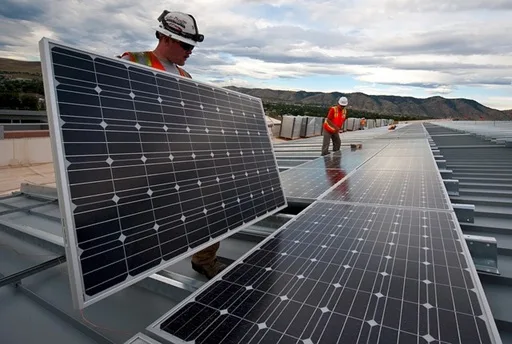The initial investment can be substantial, but with the right approach, solar panels can offer long-term savings and a positive public image. To help guide you through the decision-making process, here are some fresh perspectives and important considerations when installing solar panels for your business.
1. Energy Efficiency Before Solar Installation
While installing solar panels is a great way to reduce your energy bills, it’s essential to first ensure that your business is energy-efficient. Before investing in solar, implement energy-saving practices like upgrading to energy-efficient lighting, installing programmable thermostats, or improving insulation. By reducing your overall energy consumption, you’ll decrease the number of solar panels needed, making your investment more cost-effective. An energy audit can help identify areas where you can optimize your energy use.
2. Incorporate Solar Power into Your Brand’s Marketing
Going solar is a powerful marketing tool for your business. Not only does it save on energy costs, but it also positions your company as an environmentally responsible entity. Many consumers and clients are more likely to support businesses that prioritize sustainability. Whether through your website, social media, or product packaging, highlighting your use of renewable energy can enhance your brand image and help you appeal to an eco-conscious audience.
3. Understand Local Regulations and Zoning Laws
Each area has different regulations regarding solar panel installations. Before you begin, research the local zoning laws, building codes, and permits required in your region. In some areas, businesses may be required to meet specific safety standards or adhere to restrictions on panel size and placement. Consulting with a local professional who understands the regulations in your area can prevent delays and additional costs later in the process.
4. Long-Term Energy Management Strategy
While the upfront cost of solar installation can be daunting, there are numerous financing options available for businesses. These include solar loans, power purchase agreements (PPAs), and leasing options, which allow you to pay for your system over time. Some options also offer no upfront costs, making it easier to adopt solar energy without significant financial strain. If you’re looking for professional assistance with solar panels installation, companies like Recharge Renewable can guide you through the process and offer tailored solutions. Explore the best financing options for your budget and consult with a financial advisor to ensure that your chosen plan aligns with your business’s cash flow and growth goals.
5. Explore Financing Options
While the upfront cost of solar installation can be daunting, there are numerous financing options available for businesses. These include solar loans, power purchase agreements (PPAs), and leasing options, which allow you to pay for your system over time. Some options also offer no upfront costs, making it easier to adopt solar energy without significant financial strain. Explore the best financing options for your budget and consult with a financial advisor to ensure that your chosen plan aligns with your business’s cash flow and growth goals.
6. Choose Solar Technology That Fits Your Needs
Consider whether new technologies like solar shingles, building-integrated photovoltaics (BIPV), or concentrated solar power (CSP) systems might be more suitable for your needs. These options can offer more flexibility in how solar is integrated into your building and may be better suited for specific types of properties or industries.
7. Factor in the Environmental Impact Beyond Energy Savings
While the financial savings are significant, consider the broader environmental benefits of installing solar panels. You’ll be contributing to global efforts to combat climate change and may even be able to achieve carbon neutrality, which could appeal to clients, investors, and partners who value sustainability. Be sure to track and report your energy savings and carbon reduction efforts to showcase your business’s environmental impact.
Conclusion
By considering energy efficiency, local regulations, financing options, and choosing the right technology, you can make a well-rounded decision that supports your business’s future. With careful planning and the right strategy, solar energy can provide long-term sustainability and profitability for your business.

